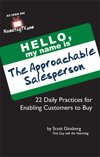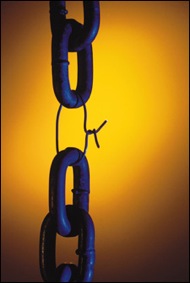 It’s hard to be inconsistent and win.
It’s hard to be inconsistent and win.
Especially now.
Customers know more, see more, remember more and repeat more – than ever before.
Everything matters.
Everybody’s watching.
Everything’s a performance.
Privacy is so last century.
And when you lack consistency, when your onstage performance doesn’t align with your backstage reality, people see through you like bottle of water.
Which doesn’t mean you have to be perfect. You are human, after all.
BUT THE REALITY IS: Consistency is far better than rare moments of greatness.
From my column on American Express Open Forum, here’s what it costs when you don’t have it:1. Inconsistency implies unreliability. When I became president of my local association, I made a bad decision selecting a second in command. Greg had developed a reputation for undependability. And his inconsistent behavior made the board look stupid on several occasions.
But I refused to believe that’s who he really was. So I gave him the benefit of the doubt. Three times. But he continued to verify my suspicions. Eventually, enough was enough. I fired him from the board. Which was especially painful considering it was a volunteer position.
People shouldn’t have to use their flake filter on you. Ground your consistency in commitment or be left behind. When people show you who they are, will you believe them?
2. Inconsistency costs trust. Many of my clients are bloggers. They’re big thinkers, great writers and smart businesspeople. The problem is, not all of them post daily. And when I bust their chops, they all use the same excuses: I don’t have the time. I can’t think of anything to write about. Nobody cares what I have to say. My industry has too much regulation. I don’t know what I’m doing.
Doesn’t matter. Credibility isn’t an entitlement – it’s a dividend. And you have to reapply for it every single day. Otherwise there’s no reason for people to believe in you. Because they’re certainly not going to waste their time playing the guessing game with your brand. They’ll simply find someone else and move on. How are you building a consistent timeline of credibility?
3. Inconsistency arouses suspicion. John Kerry may have been a war hero, but he was also a waffler. During his presidential campaign, every statement he made seemed to contradict his original position. Issues he claimed to support, he voted against ten years prior. From welfare reform to gay marriage to social security, nobody knew where he stood. No wonder he got knocked off the platform.
People shouldn’t have to wonder about your brand. If you’re truly living your values, you’ll leave no doubt in their minds who you are, what you believe why you matter. If you’re truly consistent, you’ll sustain the spirit of your brand through every touchpoint. Is the message you’re preaching the dominant reality of your life?
4. Inconsistency creates hesitation. As an author and publisher, the first lesson I learned about selling books was: The longer they take, they less they buy. If people flip through my book for more than five minutes, they are never going take it home. Complexity generates contemplation, and contemplation kills sales.
And it’s not their fault: People are tired, busy, lazy and overloaded. They don’t want to think. They don’t want to make decisions. They just want the shortcut. And that’s exactly what brands are: Shortcuts. Expectations. Predictable moments of youness. Your job is to confirm people’s hopes about the value you deliver and the values you stand for.
Otherwise there’s always an asterisk. There’s always something people can’t quite put their finger on when they’re around you. And that’s precisely why they hesitate to work with and talk positively about you. Are you taking up too much space?
5. Inconsistency causes anxiety. There’s this guy named Dalton. We’ve shared the stage a few times over the years. Good speaker. And what’s fascinating is that the first time I watched him, I later heard someone in the bathroom comment, “You know, I’ve always had a hard time taking Dalton seriously – because of his mullet.”
That’s the thing about inconsistency: People won’t listen to you if they’re too busy questioning you. The human brain has a motivational drive to reduce cognitive dissonance whenever possible. That’s why inconsistency is so dangerous: It causes frustration, which is a precursor to psychological stress. And when word and deed don’t line up, people’s heads hurt. What is affecting your ability to be taken seriously?
REMEMBER: Do something once, and that’s a treat. Do something twice, and that’s a trend. But do something every single day for a decade, and that’s a triumph.
In a world where customers know, see, remember and repeat more than ever before, everything matters.
Consistency is cheaper than apology.
LET ME ASK YA THIS…
What is inconsistency costing you?
LET ME SUGGEST THIS…
For the list called, “5 Creative Ways to Approach the Sale,” send an email to me, and you win the list for free!
* * * *
Scott Ginsberg
That Guy with the Nametag
Author, Speaker, Publisher, Artist, Mentor
[email protected]
Now booking for 2011-2012!
Watch The Nametag Guy in action here!



 Panhandlers usually respond positively to my nametag.
Panhandlers usually respond positively to my nametag.  A few years ago I gave a speech to a group of individuals with disabilities.
A few years ago I gave a speech to a group of individuals with disabilities.  “I usually refuse to pay for mentoring. But after Scott’s first brain rental session, the fact that I had paid something to be working with him left my mind – as far as I was concerned, the value of that (and subsequent) exchange of wisdom and knowledge, far outweighed any payment.”
“I usually refuse to pay for mentoring. But after Scott’s first brain rental session, the fact that I had paid something to be working with him left my mind – as far as I was concerned, the value of that (and subsequent) exchange of wisdom and knowledge, far outweighed any payment.” People don’t want to learn.
People don’t want to learn. It doesn’t take a lot of effort to wear a nametag every day.
It doesn’t take a lot of effort to wear a nametag every day. You’ve chosen an uncertain path.
You’ve chosen an uncertain path. “But if you wear a nametag all the time, doesn’t that mean you have to be nice to everyone?”
“But if you wear a nametag all the time, doesn’t that mean you have to be nice to everyone?” “I usually refuse to pay for mentoring. But after Scott’s first brain rental session, the fact that I had paid something to be working with him left my mind – as far as I was concerned, the value of that (and subsequent) exchange of wisdom and knowledge, far outweighed any payment.”
“I usually refuse to pay for mentoring. But after Scott’s first brain rental session, the fact that I had paid something to be working with him left my mind – as far as I was concerned, the value of that (and subsequent) exchange of wisdom and knowledge, far outweighed any payment.” “Love is never having to say you’re sorry.”
“Love is never having to say you’re sorry.” I once met a cowboy on the Dallas airport shuttle.
I once met a cowboy on the Dallas airport shuttle.  “I usually refuse to pay for mentoring. But after Scott’s first brain rental session, the fact that I had paid something to be working with him left my mind – as far as I was concerned, the value of that (and subsequent) exchange of wisdom and knowledge, far outweighed any payment.”
“I usually refuse to pay for mentoring. But after Scott’s first brain rental session, the fact that I had paid something to be working with him left my mind – as far as I was concerned, the value of that (and subsequent) exchange of wisdom and knowledge, far outweighed any payment.”